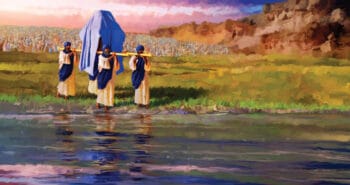Daily Lesson for Sunday 12th of October 2025
Read Joshua 3:1-5 and Numbers 14:41-44. Why did God ask the Israelites to specially prepare for what was about to happen?
This is the first time the ark of the covenant is mentioned in the book of Joshua. Until this point in the Old Testament narrative, the ark has appeared in the context of the sanctuary (Exodus 40:21) in Israel’s journey from Sinai (Numbers 10:33-36), and at the unsuccessful attempt to begin the conquest of Canaan (Numbers 14:44). It was the most sacred object in the Israelite sanctuary, and it held three objects, each expressing Israel’s special relationship with God: (1) the tablets containing the Ten Commandments; (2) the rod of Aaron, the high priest; and (3) a jar of manna (Exodus 16:33, Hebrews 9:4).
The ark and the preparations to cross the Jordan reminded the Israelites that they were not entering Canaan in their own manner and time. The conquest would be successful only if they followed God’s way and timing. God—who is described as enthroned above the cherubim that were covering the ark of the covenant (Exodus 25:22, Numbers 7:89) and whose movements are identified with the ark’s movements—enters Canaan in front of the Israelites as the One leading the conquest.
The term translated “sanctify” (Joshua 3:5) or “consecrate” (ESV) refers to a purification process similar to what the priests followed before beginning their service in the sanctuary (Exodus 28:41, Exodus 29:1) and what the people of Israel carried out prior to God’s revelation at Sinai (Exodus 19:10,14). This consecration involved the laying aside of sin and the removal of all ritual impurities. The same command appears in Numbers 11:18, relating to an impending miracle of God. Such a preparation also was required before battles were fought in a war (Deuteronomy 23:14). Before God can fight for Israel in battle, they must show their allegiance to Him and trust in Him as their Commander.
The miracle of crossing the Jordan was going to prove to the Israelites that the Lord’s promise to drive out these people in the land could be trusted. He who could secure a dry passage through the Jordan also could grant them the gift of the land.
|
God does not always part the Jordan. His interventions are not always so obvious. How do you think we can develop the spiritual preparedness to experience and discern God’s interventions on our behalf? |
 (1)
(1)



